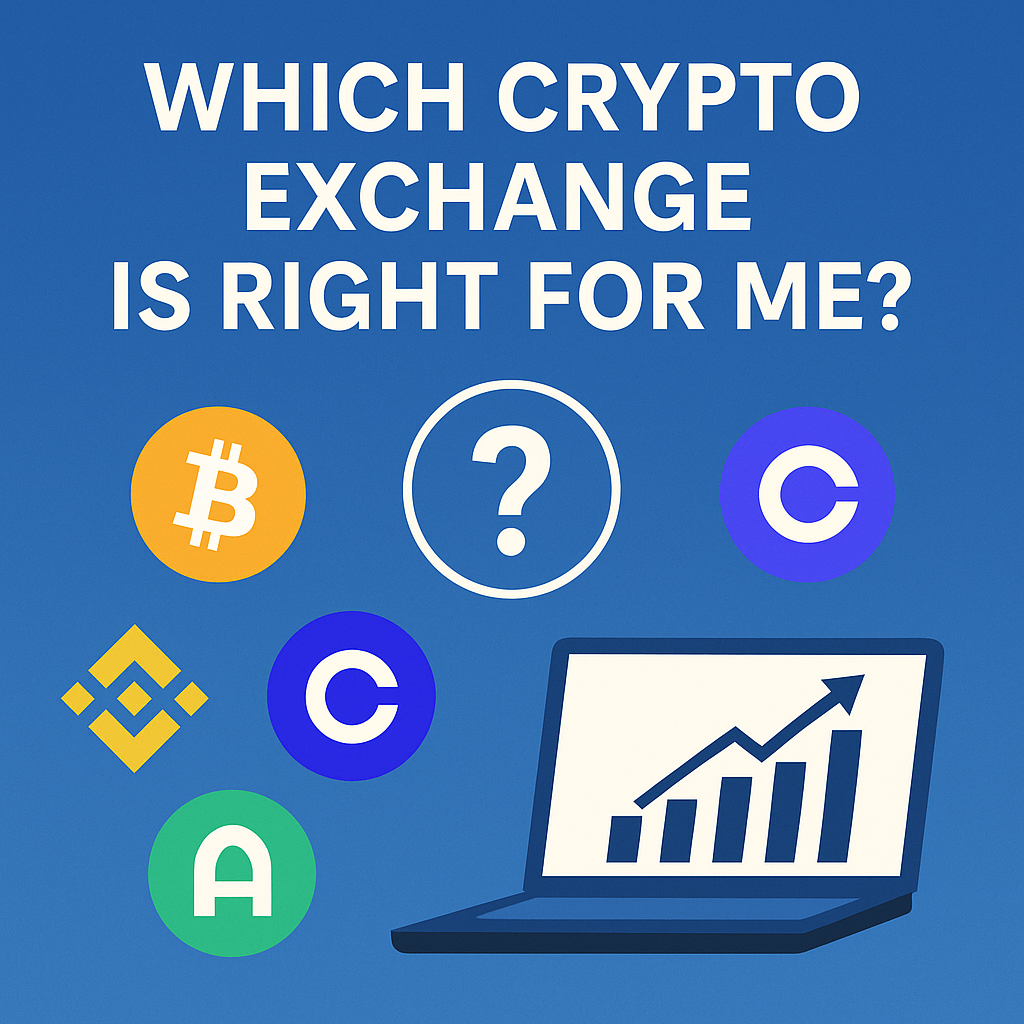Which Crypto Exchange Is Right for Me? A Guide to the Top 5 Platforms by User Base
Choosing the right cryptocurrency exchange can make a huge difference in your crypto journey — whether you’re a complete beginner or a seasoned trader. With hundreds of platforms available, it can feel overwhelming to know where to start.
In this article, we break down what really matters when selecting a crypto exchange and compare the 5 largest platforms by user base, highlighting their pros, cons, and whether they offer things like banking licenses or tax support.

What to Consider When Choosing a Crypto Exchange
Before jumping in, here are the main factors to think about:
-
Security: Does the platform offer 2FA, cold storage, and insurance?
-
Regulation: Is it licensed in your country? Does it hold a banking license?
-
Fees: Trading, deposit/withdrawal fees, and spreads can vary widely.
-
Supported Coins: Some exchanges offer 300+ tokens, others only a few dozen.
-
User Experience: Is the UI beginner-friendly? Is support responsive?
-
Payment Methods: Can you deposit via SEPA, credit card, PayPal, etc.?
-
Staking & Earn Features: Does the platform support passive income options?
-
Tax Support: Does it provide reports or API integrations with tax tools?
The Top 5 Crypto Exchanges by User Count (2025)
| Exchange | Users | Headquarters | Regulation | Pros | Cons | Tax Support | Bank / E‑Money License |
|---|---|---|---|---|---|---|---|
| Binance | ~150 million | International (no official HQ) | Partially regulated – MSB in some US states, no custody license in the EU (e.g. BaFin) | Low fees, 600+ coins, high liquidity, advanced tools, staking & NFTs | Regulatory uncertainty, complex for beginners, limited fiat options | CSV/API export + tax tool | ❌ No bank license globally; MSB registered in some US states |
| Coinbase | ~110 million | USA | Fully regulated – SEC listed, registered in the US | Beginner-friendly, secure, instant card purchases, strong compliance | High fees, fewer advanced features, limited coin selection | Built-in tax tools + CSV | ❌ No bank or e-money license |
| OKX | ~50 million | Seychelles | Partially regulated, limited access in EU/US | Competitive fees, pro tools, DeFi & NFT support | Not beginner-friendly, unclear corporate structure | Manual CSV export | ❌ No bank or e-money license |
| KuCoin | ~30 million | Seychelles | Unregulated | Huge altcoin list, low fees, margin/lending, trading bots | No fiat withdrawals, not licensed, technical issues reported | CSV/manual + third-party tools | ❌ No bank or e-money license |
| Kraken | ~10 million | USA | Highly regulated – USA, EU (MiFID), UK (EMI license since March 2025) | Very secure, strong fiat support, clean UI, staking available | Fewer coins, slower KYC process, somewhat dated interface | Full CSV/API support | ✅ Yes – SPDI bank (USA), EMI license (EU/UK) |
Which One Should You Choose?
It depends on your needs:
| Use Case | Best Choice |
|---|---|
| Absolute beginners | Coinbase, Kraken |
| Low fees / Altcoins | Binance, KuCoin |
| Full-featured trading | Binance, OKX |
| Tax reporting | Coinbase, Kraken |
| Regulation-focused | Kraken, Coinbase |
Final Thoughts
There is no perfect crypto exchange — but there is a best one for you.
Focus on security, usability, supported features, and whether the platform aligns with your personal needs (e.g., regulation, tax help, or altcoins).
And remember:
Not your keys, not your coins. Always withdraw to a self-custody wallet if you’re holding long-term.
Personal Note
As a German crypto enthusiast, I’ve personally been using Kraken since 2019 and have been very satisfied with the experience. One of the key reasons is the fast and seamless SEPA euro transfers, which make funding my account straightforward. The exchange process is simple, the app is clean and user-friendly, and Kraken’s IT security standards give me peace of mind. While every user has different needs, Kraken has proven to be a reliable and secure choice for me.
Disclaimer:
This blog post does not constitute financial advice. Investing in cryptocurrencies involves risks. Always do your own research and make informed decisions.
